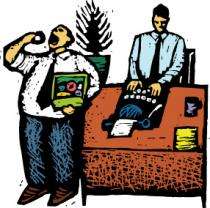Probing Question: What is the best way to handle annoying coworkers?

Irritating coworkers lurk in every office. They turn the thermostat down, drink the last drop of coffee and don't brew more, eavesdrop on your calls, then stop by to whine about their workload when you're trying to wrap up a report. Or maybe they talk too loud just outside your office, their every word shattering your concentration.
What to do?
First, try to understand what is important to that person in that situation, said Barbara Gray, director of the Center for Research in Conflict and Negotiation at Penn State. "Underlying any behavior is a legitimate need," Gray teaches her students. "The question is: How do we negotiate how you meet your legitimate need and I meet mine when they are in conflict?"
First step: Try to get the coworker to articulate the need, and then acknowledge it. Mistaken assumptions about the other person's motives can make a situation worse instead of better.
Now comes the hard part. Find a neutral way to describe your own need, said Gray, and state your earnest desire to find a harmonious way to resolve the conflict. "As soon as someone makes us the bad guy, our defenses go up and we're not listening," she said.
Stating your position without putting the other person on the defensive is immensely difficult because everyone has a different comfort level with conflict, said Gray. Childhood experiences play a role in the way we handle confrontations as adults: some people grew up in families in which anger was expressed with verbal or physical abuse; others in families in which no emotion was ever expressed.
In academia, conflicts related to ego and self-esteem are more prevalent than in other settings, Gray added. "We academics pride ourselves on our knowledge and intellectual prowess and these qualities are accentuated in our reward structure." When self-worth is threatened -- whether intentionally or not -- it can rattle an academic's "core self," making for a particularly difficult conflict.
"Since few faculty and administrators receive managerial training in dispute resolution, they are not always comfortable or particularly skillful in dealing constructively with conflicts when they arise," she said.
Along with colleagues Ronda Callister, Maurice Schweitzer, Donald Gibson and Joo-Seng Tan, Gray recently studied anger expression in several different types of organizations, including social service, sports, labor and health-care.
"What we found," said Gray, "is that when anger isn't dealt with constructively and instead is suppressed or directed at the wrong target, there are both personal implications and organizational implications," which may include behavioral changes, disease, depression and diminished productivity.
The best approach, the researchers determined, is "controlled anger expression:" The offended person calms down, tries to understand what's causing the conflict and calmly approaches the other person to talk about both of their needs. If the conflict grows, a neutral third-party should be available. Department chairs and managers should be able to intervene as third parties in small disputes. For larger ones, each college at Penn State has an ombudsperson, whose objective is to "enhance communication and clarify possible misunderstandings in situations which involve potential disputes ... and to help settle matters before they become hardened into serious disputes." This kind of mediation can work informally to ease communication and help parties reach a resolution, said Gray, who has served as a Penn State ombudswoman.
So the next time a co-worker invades your space, drinks your soda or subjects you to his "La Cucaracha" ring tone for the hundredth time, take a deep breath and try to find a calm, non-blaming resolution to the conflict. If that doesn't work, remember: Don't escalate -- mediate.
Source: Research/Penn State, By Lisa Duchene















